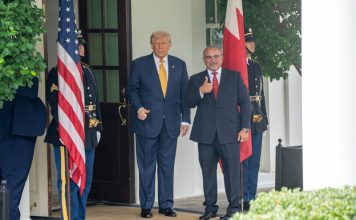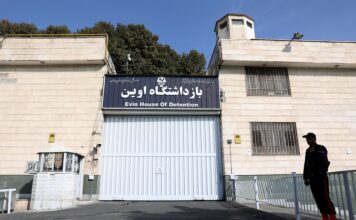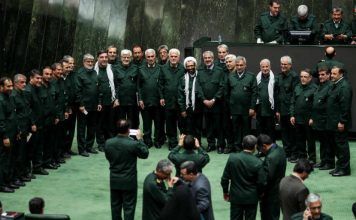
By Daphne Psaledakis
WASHINGTON, Nov 3 (Reuters) – The United States on Thursday issued sanctions against an international oil smuggling network it said supports Hezbollah and Iran‘s Quds Force, targeting dozens of people, companies and tankers as Washington sought to mount pressure on Tehran.
The U.S. Treasury Department in a statement said it designated members of the network that facilitated oil trades and generated revenue for Lebanon’s Iran-backed Hezbollah and the Quds Force, an arm of Iran‘s Revolutionary Guards that operates abroad, both of which are under U.S. sanctions.
The latest U.S. move against Iranian oil smuggling comes as efforts to revive Iran‘s 2015 nuclear deal have stalled and ties between the Islamic Republic and the West are increasingly strained as Iranians keep up anti-government protests.
The Treasury said the network designated on Thursday included key individuals, front companies and vessels it accused of being involved in blending oil to conceal the Iranian origins of the shipments and exporting it around the world in support of the Quds Force and Hezbollah.
“Market participants should be vigilant of Hizballah and the IRGC-QF’s attempts to generate revenue from oil smuggling to enable their terrorist activities around the world,” said Brian Nelson, the Treasury’s Under Secretary for Terrorism and Financial Intelligence, in the statement.
Moscow and Tehran Discuss Swapping Supplies for Oil and Gas, Goods Logistics
Iran‘s mission to the United Nations in New York did not immediately respond to a Reuters request for comment.
The move targeted a Persian Gulf-based network that the Treasury said as of mid-2022 were blending and exporting Iranian oil. The network used storage units in the Port of Sharjah in the United Arab Emirates and blended products of Indian origin with Iranian oil to obfuscate the origin, Washington said.
The companies modified or created counterfeit certificates of origin and quality for the oil, which was then transferred for sale abroad, Treasury said.
Some oil sales were planned to Asia buyers as of late 2021, and Ava Petroleum – one of the entities designated – coordinated an oil shipment to China, according to Treasury.
Washington targeted Viktor Artemov, Edman Nafrieh, Rouzbeh Zahedi and Mohamed El Zein, as well as companies under their control, such as Ava Petroleum, that Treasury said were used to conduct the activities.
Companies in Switzerland, the United Arab Emirates, Singapore, Turkey, Iran and the Marshall Islands were among those designated, according to Treasury’s website.
U.S. Secretary of State Antony Blinken in a separate statement said the network had facilitated the sale of hundreds of millions of dollars’ worth of oil for Hezbollah and the Quds Force.
The sanctions freeze the U.S. assets of those designated and generally bar Americans from dealing with them. Those that engage in certain transactions with them also risk being hit with sanctions.
Washington maintains sweeping sanctions on Iran and has looked for ways to increase pressure as efforts to resurrect the 2015 nuclear deal have stalled.
U.S. President Joe Biden had sought to negotiate the return of Iran to the nuclear deal after former President Donald Trump pulled out of the agreement in 2018.
The 2015 agreement limited Iran‘s uranium enrichment activity to make it harder for Tehran to develop nuclear arms in return for lifting international sanctions.
(Reporting by Daphne Psaledakis, Katharine Jackson and Tim Ahmann; Editing by Chizu Nomiyama, William Maclean and Bernadette Baum)











